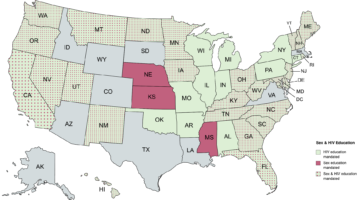Could Antibacterial Mouthwash Help Prevent the Spread of Gonorrhea?
January 25, 2017 by Justin Lehmiller
One sexually transmitted infection (STI) that has public health officials increasingly worried is gonorrhea. Although infection rates have declined dramatically from their peak in the 1970s, research has found that not only is gonorrhea on the rise again, but that this infection has also become more resistant to antibiotic treatments. Essentially, what this means is that we have fewer and fewer drugs available that can successfully clear it from the body. Scientists fear that, eventually, a strain may emerge that we can’t cure. As such, more research into gonorrhea treatment and prevention strategies is urgently needed.
A new set of studies suggests that one tool that could potentially help in the fight against antibiotic-resistant gonorrhea is—wait for it—mouthwash. But not just any mouthwash—we’re talking specifically about antibacterial mouthwashes, such as Listerine.
Believe it or not, the company that makes Listerine marketed it as a cure for gonorrhea back in the late 1800s; however, no one actually tested this idea until now. In a new paper published in the journal Sexually Transmitted Infections, the results of two studies suggest that there may be a hint of truth to those claims.
First, researchers performed an in vitro experiment to determine whether Listerine would stop gonorrhea bacteria from growing in a lab setting. They did this by putting gonorrhea bacteria in petri dishes and then filling them with either Listerine (one of two kinds: Cool Mint or Total Care) or saline solution (the control condition).
They found that both kinds of Listerine substantially inhibited bacteria growth, whereas saline did not.
Second, they performed a randomized controlled trial involving 58 young men who have sex with men (aged 27 on average), all of whom tested positive for gonorrhea infections of the throat. Approximately half of these men were asked to perform a one-minute rinse with Listerine Cool Mint, while the other half gargled with saline for the same amount of time. Following this, researchers took throat swabs from three different areas.
What they found was that men who rinsed with Listerine were less likely to test positive for gonorrhea on these swab tests than men who rinsed with saline. This was true for tests conducted at all three locations. For men in the Listerine group, positive test results emerged 52-57% of the time, compared to 70-90% of the time for those in the saline group.
While promising, there are several important limitations of this study that should give us great pause before leaping to conclusions. For one thing, researchers studied a small group of men, most of whom still tested positive for gonorrhea at the end of the study no matter what they gargled with. In other words, we’re clearly not dealing with a miracle cure here. In addition, these men only engaged in a one-minute rinse and had their throats swabbed right afterward. Thus, while there was clearly an immediate effect in the areas of the throat the researchers swabbed, this study doesn’t tell us anything about long-term effects. Do the bacteria return and, if so, how quickly? What if these guys gargled with Listerine regularly? Would that reduce their odds of transmitting the infection to others? Would it eventually cure their current infection? And it would prevent future infections? We just don’t know.
Clearly (and as the scientists themselves acknowledge), we have a lot more to learn before we go out recommending that everyone start using mouthwash as part of their sexual health routine. Plus, it’s important to highlight that even if Listerine is shown to be effective at preventing and/or treating gonorrhea infections, gonorrhea can obviously still infect areas of the body other than the throat, including the penis, vagina, and anus, so we still need to be promoting condom use, too.
Thus, while these results suggest that Listerine might have the potential to prevent gonorrhea infections spread via oral sex, we need far more research to understand just how effective it is and, even if it were to work really well, it would only be just one part of a multi-pronged approach to combating this STI.
Want to learn more about Sex and Psychology ? Click here for previous articles or follow the blog on Facebook (facebook.com/psychologyofsex), Twitter (@JustinLehmiller), or Reddit (reddit.com/r/psychologyofsex) to receive updates.
To learn more about this research, see: Chow, E. P., Howden, B. P., Walker, S., Lee, D., Bradshaw, C. S., Chen, M. Y., … & Fairley, C. K. (2016). Antiseptic mouthwash against pharyngeal Neisseria gonorrhoeae: A randomised controlled trial and an in vitro study. Sexually Transmitted Infections, sextrans-2016.
Image Source: 123RF.com/theartofphoto
You Might Also Like:

Dr. Justin Lehmiller
Founder & Owner of Sex and PsychologyDr. Justin Lehmiller is a social psychologist and Research Fellow at The Kinsey Institute. He runs the Sex and Psychology blog and podcast and is author of the popular book Tell Me What You Want. Dr. Lehmiller is an award-winning educator, and a prolific researcher who has published more than 50 academic works.
Read full bio >


